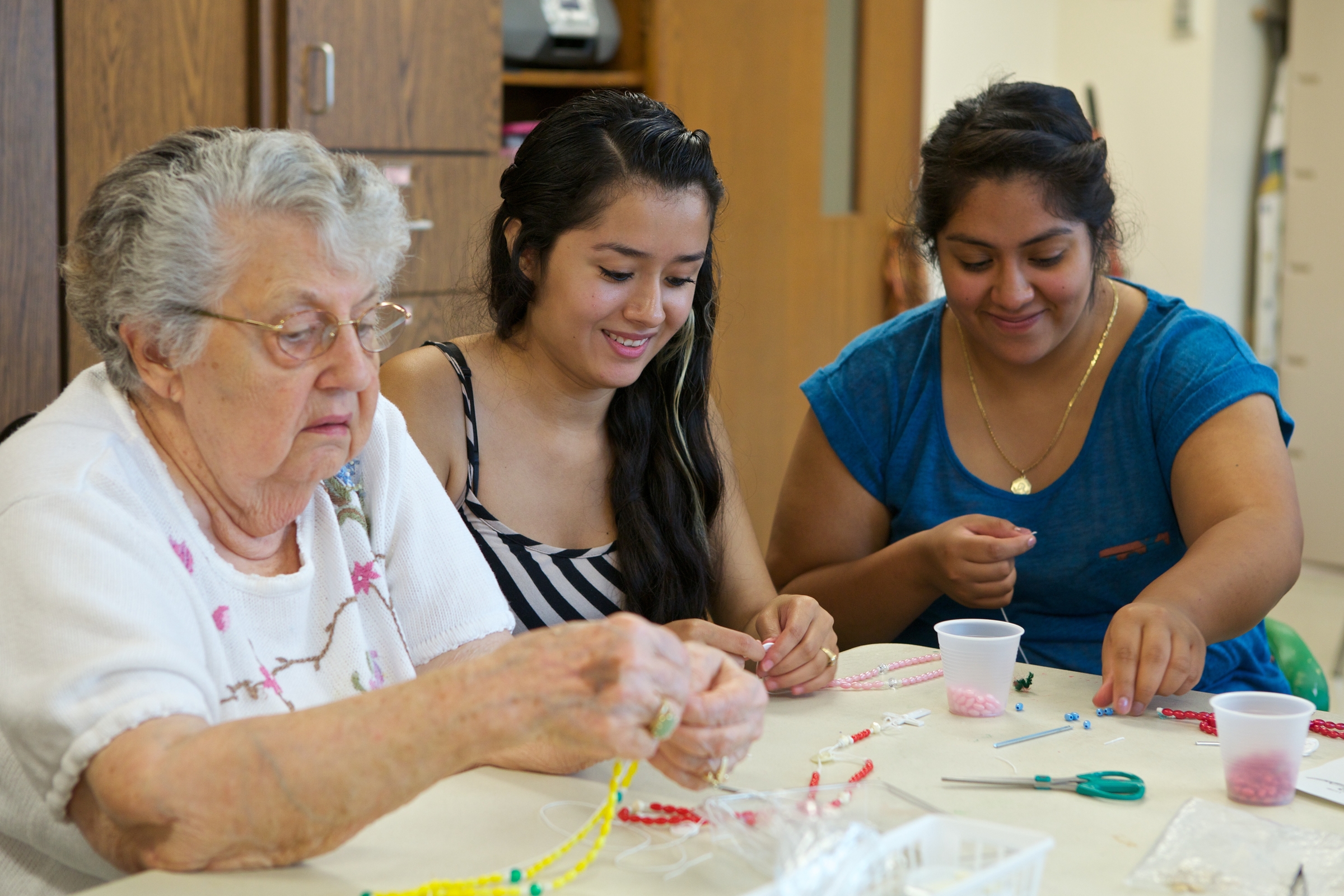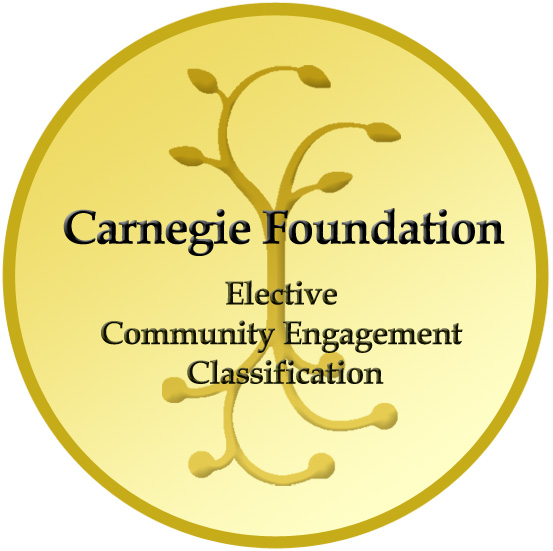 DePaul University students help seniors assemble crafts during the 2012 new student service day, a day set aside at the beginning of the academic year for all new students to participate in service projects. Community service by students, faculty, staff and alumni, is one of the reasons DePaul received the 2015 Community Engagement Classification from the Carnegie Foundation for the Advancement of Teaching. (Photo by Jeff Carrion)
DePaul University students help seniors assemble crafts during the 2012 new student service day, a day set aside at the beginning of the academic year for all new students to participate in service projects. Community service by students, faculty, staff and alumni, is one of the reasons DePaul received the 2015 Community Engagement Classification from the Carnegie Foundation for the Advancement of Teaching. (Photo by Jeff Carrion)CHICAGO — DePaul University has received the 2015 Community Engagement Classification from the Carnegie Foundation for the Advancement of Teaching, a Boston-based independent policy and research center.
DePaul also was included in the first class of designees in 2006 for the classification, which recognized institutions that demonstrated an engagement with local, regional, national and global communities, according to John Saltmarsh, director of the New England Resource Center for Higher Education. The center serves as Carnegie Foundation’s administrative partner for the Community Engagement Classification process.
“It is a privilege to be recognized again for the deep networks that connect DePaul University with the city of Chicago, and for our public service mission, which is rooted in the legacy of our patron, St. Vincent de Paul,” said the Rev. Dennis H. Holtschneider, C.M., president of DePaul.
DePaul is one of 11 universities to receive the 2015 designation in Illinois, and one of 361 campuses that currently hold the Community Engagement Classification. DePaul will retain the classification until 2025.
“These are campuses that are improving teaching and learning, producing research that makes a difference in communities, and revitalizing their civic and academic missions,” said Saltmarsh.
In the application process, DePaul shared some of the ways its commitment to the community has progressed and deepened in recent years, including more than 500,000 hours of documented community service delivered annually by DePaul students.
“We’ve reached a critical point at DePaul in which we have shifted our efforts from simply increasing the quantity of community engagement to deepening the quality of our work with organizations across the City of Chicago and internationally,” said Howard Rosing, executive director of DePaul’s Irwin W. Steans Center for Community-based Service Learning and the Msgr. John J. Egan Office for Urban Education and Community Partnerships.
One example is the Master’s Entry to Nursing Practice program for non-nurses, which is an accelerated degree for college graduates who want to become nurses. “Service learning is integrated throughout the full two-year program,” Rosing said, adding that DePaul student nurses provide nearly 150,000 hours of hands-on care to community organizations, patients in hospitals and clinics annually.
 “The opportunity to bring ideas, research, resources and service to bear on the community is a primary reason faculty, students and staff come to DePaul. It’s what we do,” said the Rev. Dennis H. Holtschneider, C.M., president of DePaul University, which received the 2015 Community Engagement Classification from the Carnegie Foundation for the Advancement of Teaching.
“The opportunity to bring ideas, research, resources and service to bear on the community is a primary reason faculty, students and staff come to DePaul. It’s what we do,” said the Rev. Dennis H. Holtschneider, C.M., president of DePaul University, which received the 2015 Community Engagement Classification from the Carnegie Foundation for the Advancement of Teaching. Additionally, DePaul’s engagement with Chicago public and Catholic schools and after-school programs delivers effective support to economically distressed neighborhoods, noted Rosing. “This involves not only supporting teachers and students during the day and assisting students through tutoring and enrichment activities after school to ensure their academic success, but also helping to engage schools with their local communities,” he said.
“The opportunity to bring ideas, research, resources and service to bear on the community is a primary reason faculty, students and staff come to DePaul. It’s what we do,” said Holtschneider. “In that sense, a commitment to community engagement is institutionalized naturally by the desires and actions of those who spend their careers here.”
In additional to annual service days, engagement with the local community extends to less expected corners of the university, including:
- The DePaul Art Museum is the preeminent center for the history and display of Chicago artists.
- Art students and faculty provide community-organizing projects built around public wall murals.
- The School of Music provides one of the major community music schools in Chicago, free of charge.
- The Theatre School provides children’s theatre throughout the academic year for thousands of school children.
- The College of Law faculty and students work together to provide free legal clinics for the poor, those in family difficulties and the undocumented.
- The university’s archives and special collections have created a specialization in preserving the histories of local communities and the personal papers of people who have made significant contributions to major societal issues, such as Sister Helen Prejean, C.S.J., who entrusted to DePaul her ground-breaking work to end the dealt penalty.
“St. Vincent de Paul gave his life to address poverty in his midst,” said Holtschneider. “That is DePaul’s central mission as well. It is reflected in whom we choose to educate, how we insert our students into community service, how we deploy our faculty and staff expertise, and how we leverage our resources.”
Additional information about the Community Engagement Classification is online at http://bit.ly/Carnegie2015Classification.
With nearly 24,000 students and about 300 academic programs, DePaul is the largest Catholic university in the United States and the largest private, nonprofit university in the Midwest. DePaul was founded in Chicago in 1898 by the Congregation of the Mission (Vincentians), a Roman Catholic religious community dedicated to following the ideals of St. Vincent de Paul, the 17th century priest for whom the university is named.
DePaul’s tradition of providing a quality education to students from a broad range of backgrounds, with particular attention to first-generation students, has resulted in one of the nation’s most diverse student bodies. More information is online at www.depaul.edu.
###
Media Contact:
Carol Hughes
chughe23@depaul.edu
312-362-8592